Attending the announcement ceremony were: MOST Minister Huynh Thanh Dat; MOST Deputy Minister Bui The Duy; Ms. Carolyn Turk, World Bank Country Director for Vietnam; Ms. Robyn Mudie, Australian Ambassador to Vietnam; President of the Vietnam Union of Science and Technology Associations Phan Xuan Dung; Full-time Vice Chairman of the Central Theoretical Council Ta Ngoc Tan; General Secretary of the Vietnam Chamber of Commerce and Industry Nguyen Quang Vinh; leaders of the Committee on Science, Technology and Environment of the National Assembly; Vietnam Academy of Science and Technology, Hanoi National University; Vietnam Women's Union; Central Institute for Economic Management; Representatives of leaders of ministries and central agencies; leaders of universities and research institutes; professionals, scientists, and businesses.
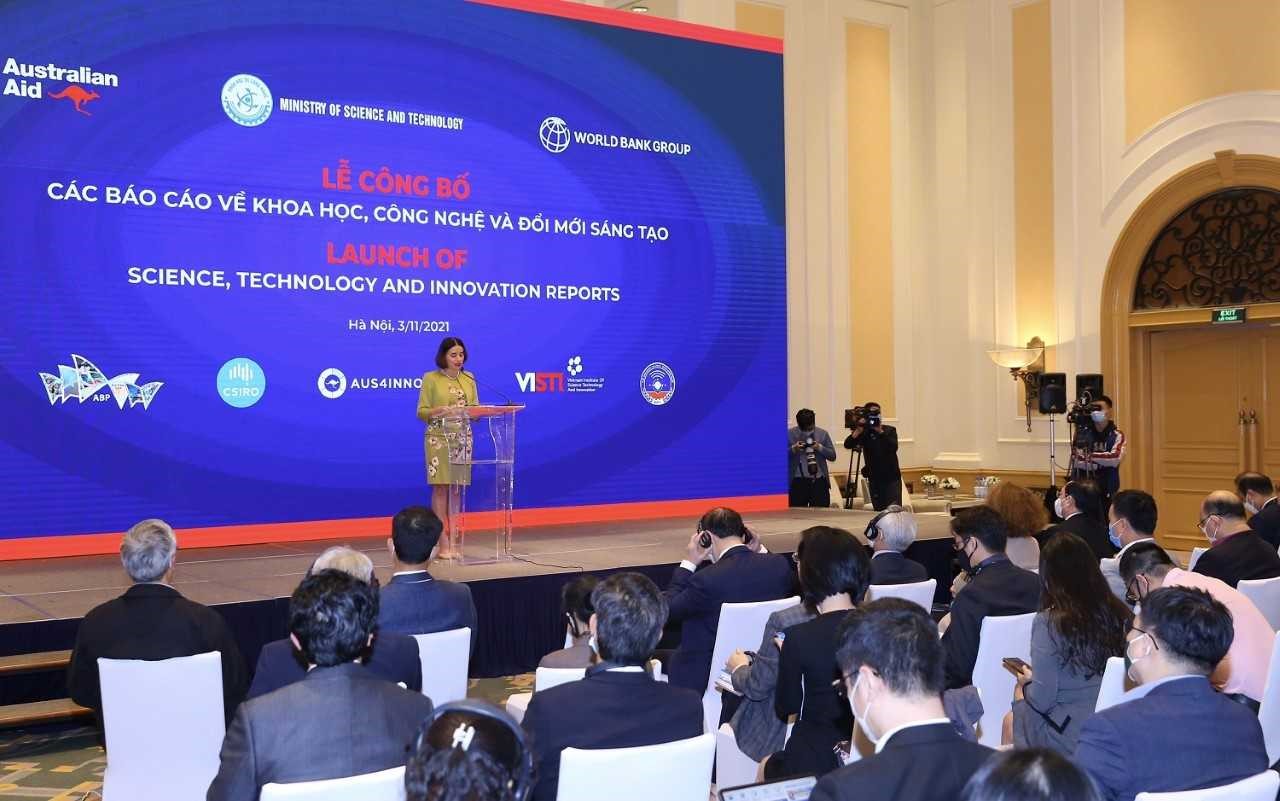
Overview of the announcement ceremony.
Innovation to help Vietnam overcome challenges
The report "Science, Technology and Innovation in Vietnam" is a product of the Analysis and Advisory Support Program (ASA) of the World Bank (WB) on improving innovation capacity in Vietnam. Male. The report was developed at the order of the Ministry of Science and Technology of Vietnam, funded by the Phase II Strategic Partnership Program between the Australian Government and the World Bank Group (ABP2). The report studies the current development framework and policy on science, technology and innovation (STI); analyzes the bottlenecks hindering enterprises from innovating; makes proposals and recommendations for comprehensive improvement to drive innovation-based growth.
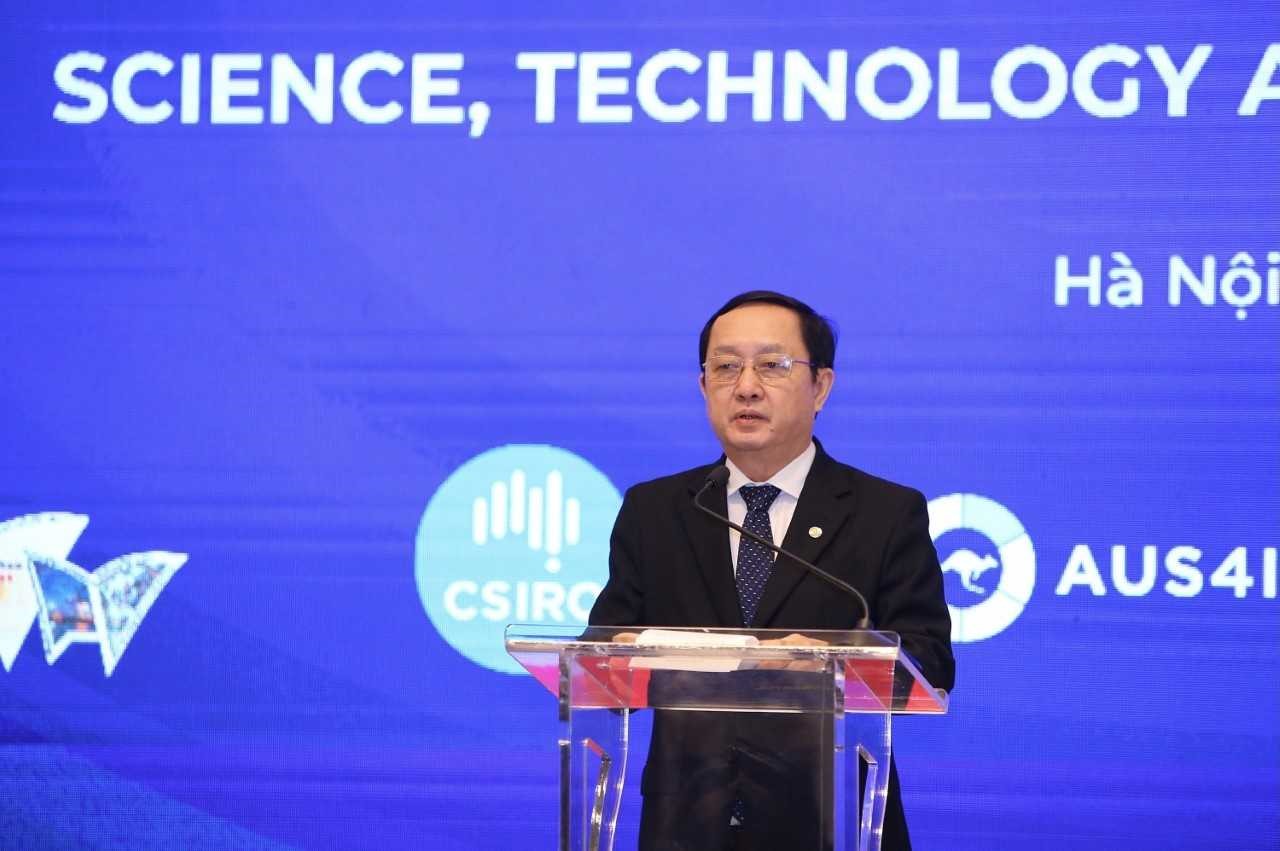
MOST Minister Huynh Thanh Dat speaks at the announcement ceremony.
Ms. Carolyn Turk, World Bank Country Director for Vietnam, said: “Vietnam will need new drivers of economic growth in order to achieve its ambition of becoming a high-income economy by 2045. Innovation will be the fundamental foundation in raising incomes and improving the quality of growth. However, there are different approaches to fostering innovation and this report offers ideas that may be relevant for Vietnam. "Innovation becomes the key to overcome existing challenges, is a breakthrough strategy for innovation in Vietnam," said World Bank Country Director in Vietnam.
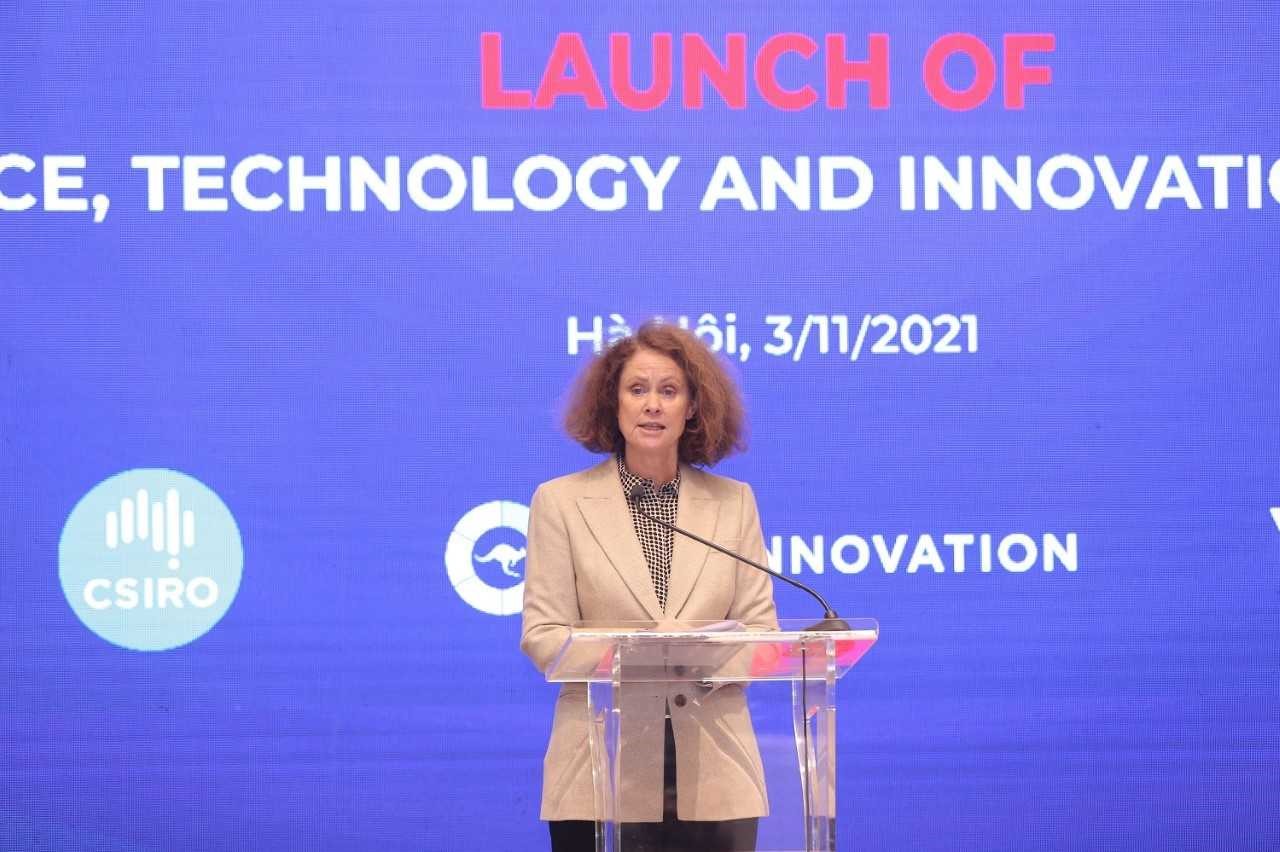
Ms. Carolyn Turk, World Bank Country Director in Vietnam, speaks at the Announcement Ceremony.
The report recommends that Vietnam should rebalance its STI development policy, shifting from focusing on investment in creating advanced technologies to promoting technology absorption and diffusion among groups of businesses. Technological spillovers – not just research and development – can lead to significant productivity and economic transformation. This is the crux of policy interventions and government support can be most beneficial.
Attention to capacity building to take full advantage of the most up-to-date technologies should be a top priority. Closing the workforce skills gap – both qualitatively and quantitatively – will also be critical to harnessing the full power of innovation.
These findings and recommendations are in line with the previous World Bank regional report titled “Innovation in East Asian Developing Countries – Urgent Requirements”. This report has pointed out the mismatch between innovation policies and the capabilities and needs of businesses and organizations. This is also a common problem among countries in the region, one reason for lagging advanced economies in terms of breadth and intensity of use of new technology.
The report argues that deeper adoption of innovation can help countries overcome new challenges to continue to thrive, including factors of global geopolitical conflict, the COVID-19 pandemic, climate change, and a dramatic decline in productivity growth. To spur innovation requires a comprehensive reform agenda. In addition to reorienting STI policies to better suit the capabilities and needs of businesses, countries need to strengthen important complementary factors such as workers' skills and access to finance for innovative projects.
Affirming the significant role of STI
The impact of technology absorption is also clearly quantified in the report “Technological innovation in Vietnam: Assessing the impact of technology on economic growth” by CSIRO, the Australian National Science Agency and Units under the Ministry of Science and Technology of Vietnam jointly implement.
Sponsored by the Aus4Innovation Program, the report provides tools to assess the status quo and impact of technological progress and innovation on Vietnam's economic growth. By applying economic models to a large database of enterprises' technology absorption in Vietnam, the research results show that technology contributes more and more to the economic growth of Vietnam in the period 2016-2019.
Speaking at the announcement ceremony, Ms. Robyn Mudie, Australian Ambassador to Vietnam, shared: “Australia has been supporting Vietnam to make evidence-based policy decisions in the fields of STI, and this report is another milestone in our partnership. A team of researchers from Australia and Vietnam worked on this report for a year and a half, collecting and analyzing data over a period of nearly 20 years to develop two modern economic models to quantify the contribution of technological progress to economic growth. We hope that the Ministry of Science and Technology can apply these two models in planning long-term national policies on STI".
The report is an important policy reference in Vietnam's economic transition to 2030, with a vision to 2045, and shows that innovative factor plays an increasingly important role in economic growth compared to capital and cheap labor.
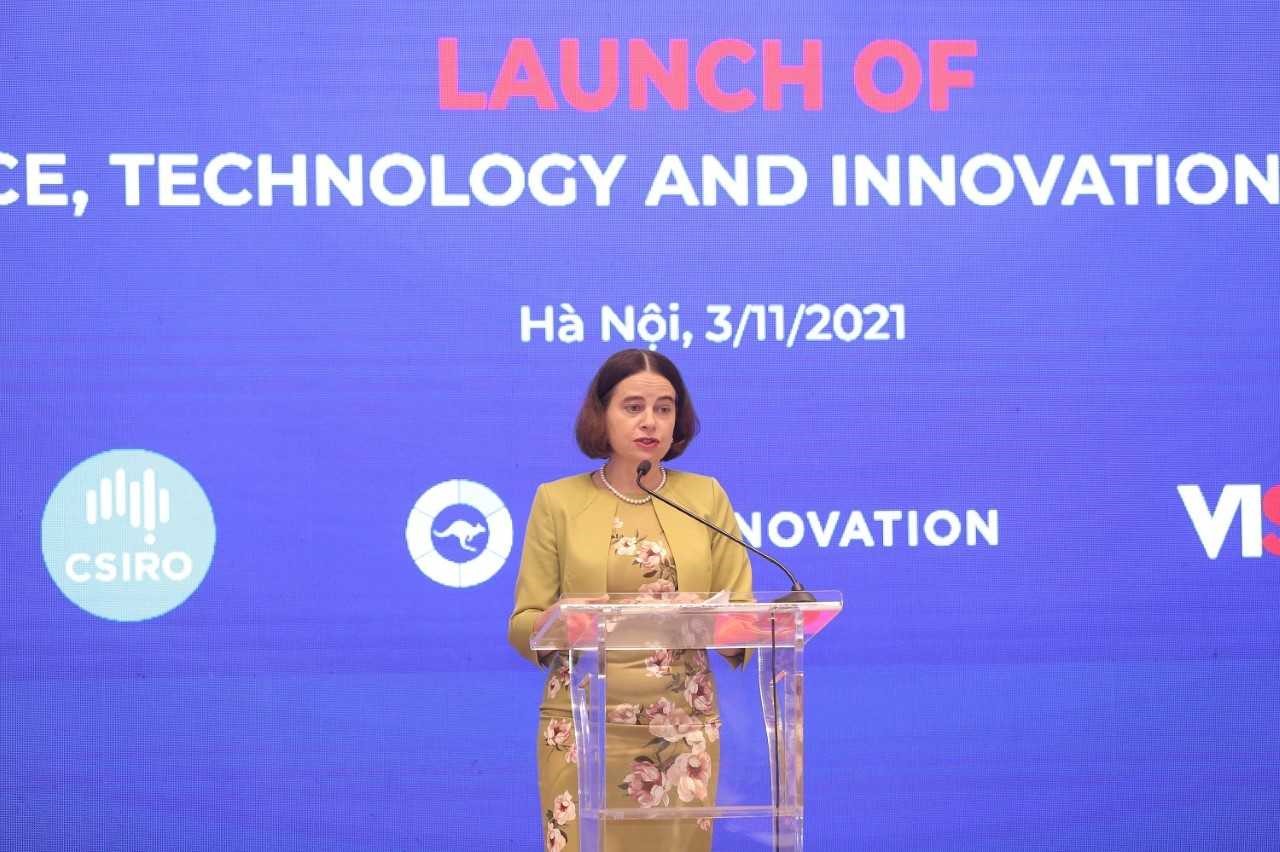
Ms. Robyn Mudie, Australian Ambassador to Vietnam, speaks at the Announcement Ceremony.
Speaking at the announcement ceremony, Minister Huynh Thanh Dat emphasized: The reports clearly show the important role of STI in socio-economic growth in Vietnam and the path to Vietnam moving forward, constantly improving and enhancing the capacity of the innovation ecosystem.
“We will continue to strengthen the national innovation system to further promote the creation, dissemination and application of knowledge and technology to serve the country's sustainable development goals by 2030 and 2045. The MOST highly appreciates the support of the Australian Government and the World Bank in these efforts and looks forward to further collaborative initiatives to put these useful recommendations and tools into real world," said Minister Huynh Thanh Dat.
At the event, representatives of implementation units shared about the important contents of the report. Accordingly, in the Report "Technological Innovation in Vietnam - Assessing the Impact of Technology on Economic Growth", World Bank experts focus on analyzing specific changes in policies and proposals propose institutional options to enhance the application of STI in enterprises. This information is important, as input information to support the development of the STI strategy for the period 2021-2030 and the Socio-Economic Development strategy for 2021-2030.
To develop the report, the Ministry of Science and Technology and the World Bank held many high-level meetings and professional exchanges between the two sides to agree on the implementation method and content of the report. World Bank experts through many seminars, exchange and work with relevant agencies of Vietnam to collect information. Many ministries, branches, Departments of Science and Technology, universities and about 200 businesses across the country have provided important input information for the report.
In the Report "Technological Innovation in Vietnam - Assessing the Impact of Technology on Economic Growth" provides a data set on technology (with over 4.5 million records) for socio-economic data of Vietnam from 2001 to 2019. These data are synthesized, classified, standard, then using advanced econometric models to quantify the contribution of technological progress to economic growth, as well as the STI mechanism impact on the Vietnam’s economy.
Technological innovation to be the key for breakthrough businesses
At the discussion session, managers, scientists, and businesses discussed the role of STI in socio-economic development and in enterprises.
Mr. Nguyen Doan Ket, Deputy General Director of Rang Dong Lamp Joint Stock Company, said that there is no model of innovation for all businesses, but they must find steps that match the capacity and qualifications of each enterprise. However, he affirmed, creativity and technological innovation will be the key for businesses that want to breakthrough. Accordingly, in Rang Dong, three research centers have been built (light, digital technology, and business model development on digital commerce platforms) with the aim of creating and designing in Vietnam, produced by Vietnamese people but products bring high added value.
Ms. Pham Hien, Data61- CSIRO Project, assessed STI as a pillar in the strategic relationship between Vietnam and Australia. She said that Vietnam is benefiting from the application of STI, seeing the difference between different industries that have been taking advantage of the results of STI. However, there are many emerging industries that still need to continue to accumulate innovative knowledge and how to commercialize S&T studying results. Through recent studies, Ms. Pham Hien said that many industries in Vietnam have developed strongly in S&T such as the energy sector (renewable, solar, wind energies, and power management). In particular, the pharmaceutical industry has become a prominent field in applying innovation in the introduction of new products.
Sharing information at the discussion session, Deputy Minister Bui The Duy assessed that the published reports are the result of a thorough working process of international and Vietnamese experts. The report shows an objective and honest picture showing strengths and weaknesses, pointing out some main drawbacks in innovation with an imbalance in the development of knowledge creation and absorption at enterprises. Looking from the Asian developing country report, it is clear that S&T investment has not yet reached the threshold necessary to create a leap for the economy, and Vietnam is also in this group.
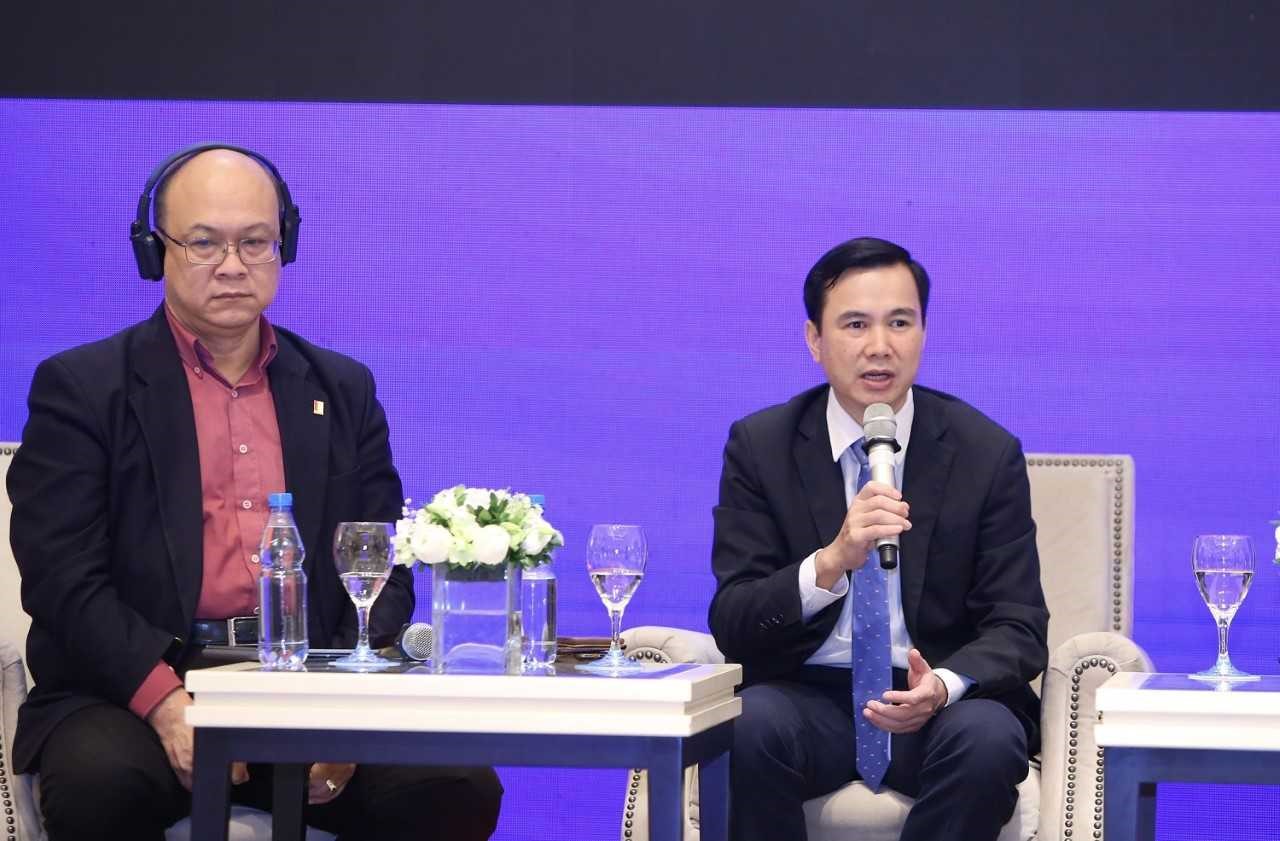
Deputy Minister Bui The Duy shares s at the discussion session.
It is a fact that manufacturing enterprises are still using technology 1.0 (manufactured by hand), 2.0 (automatically manufactured without computer connection), and existing a big gap with technology 4.0. Accordingly, Deputy Minister Bui The Duy said that there should be an investment to create motivation for businesses to dare to innovate technology for more sustainable development. Over the past time, businesses that have been able to maintain and develop well during the COVID-19 pandemic are the best evidence for their effective investment in STI.
Vietnam has had rapid development in both economic and technological aspects in recent years. The role of leaders and effective institutions will be the key for Vietnam to take advantage of opportunities in applying STI and remove bottlenecks to continuously develop stronger.
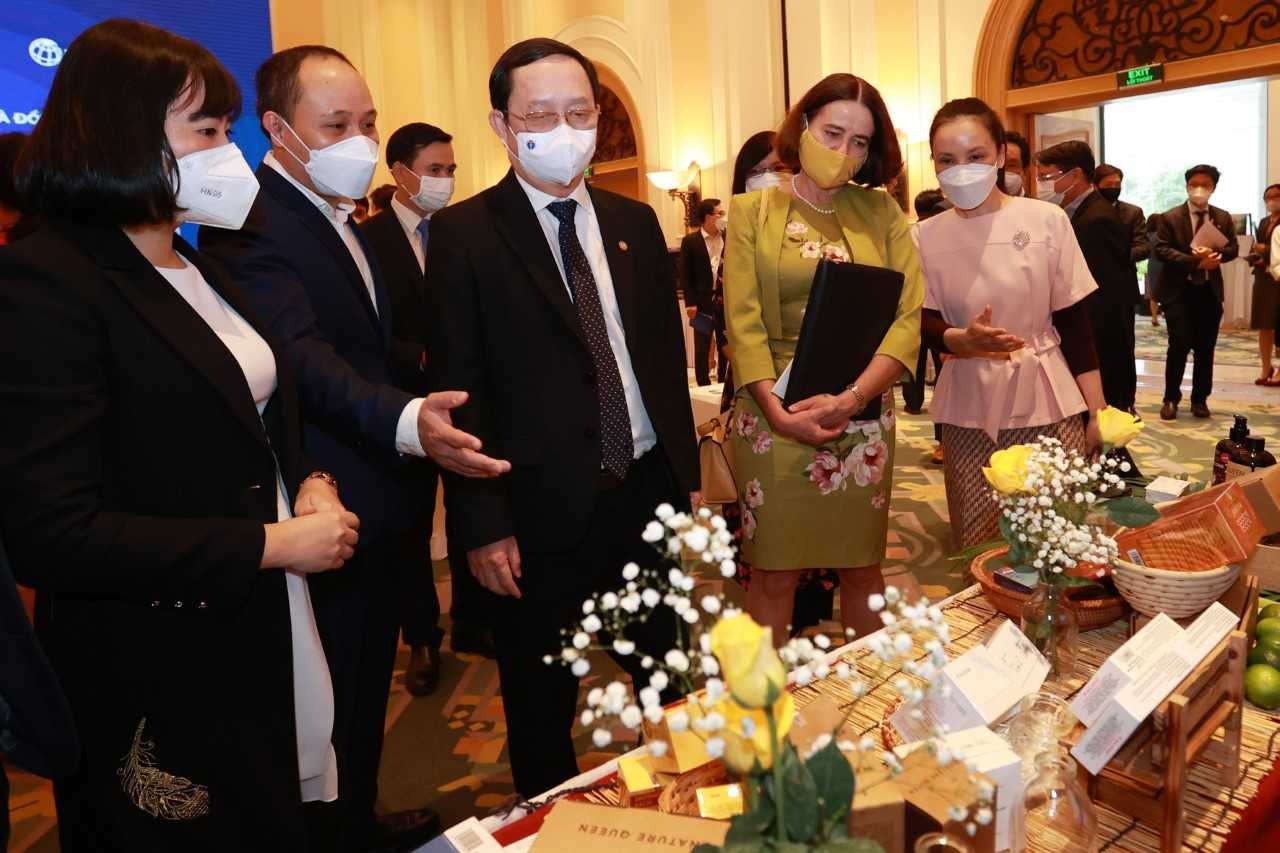
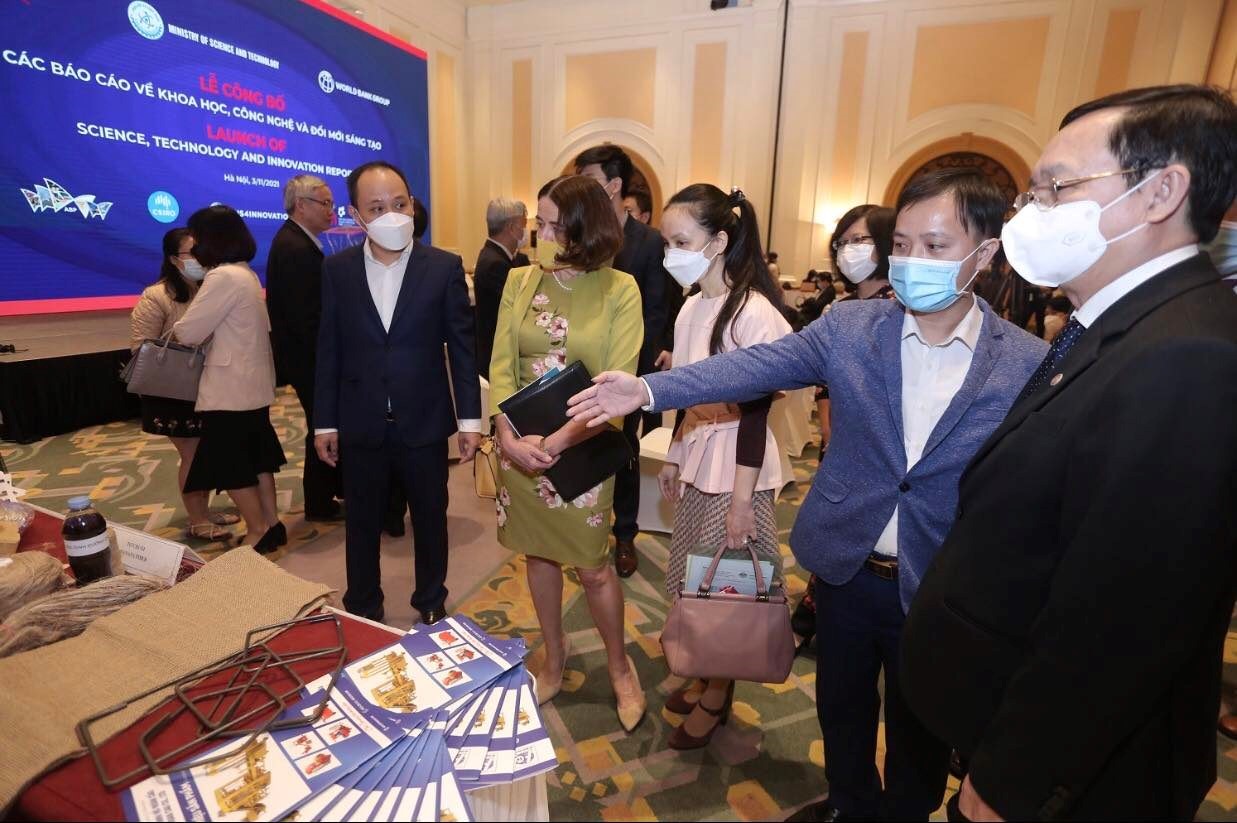
Delegates visits practical models and innovative products at the event.

Speakers share at the discussion session.